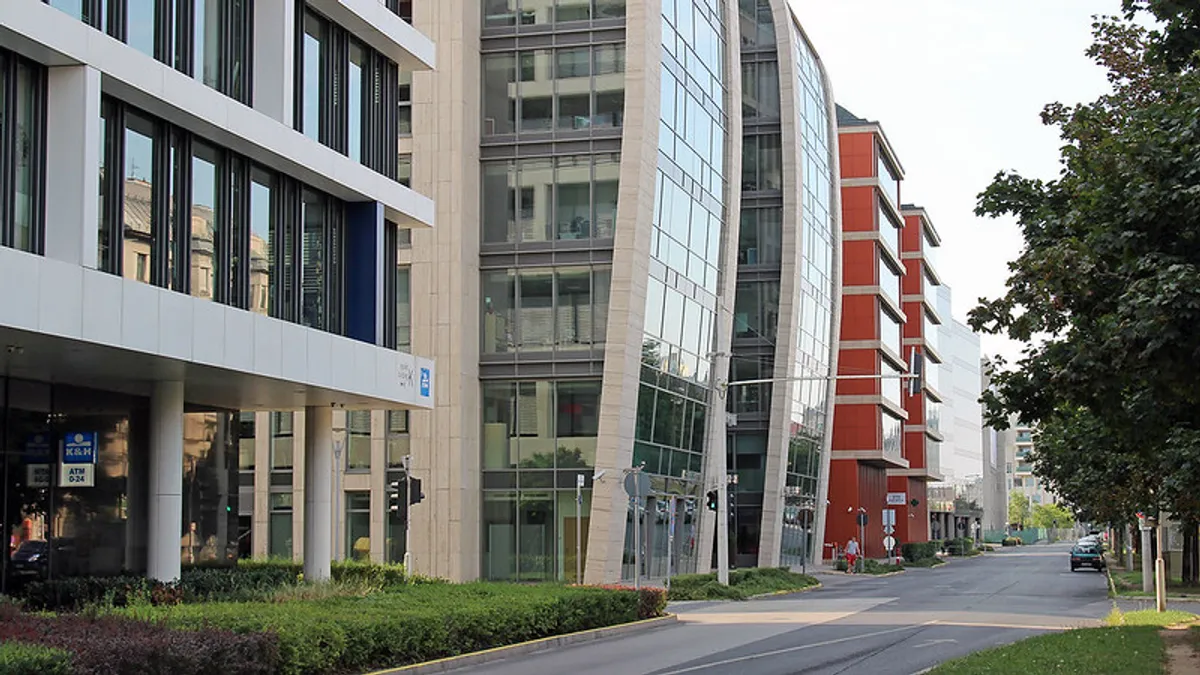CFOs face consequential decisions over the next six months as the fallout from COVID-19 on commercial real estate crystallizes. Whether to buy or sell property, whatever asset class the CFO is concerned with, or what to do about leasing, the market is shifting in major ways, property specialists said in a Turnaround Management Association webcast.
For some asset types, such as hotels and other hospitality properties, the pandemic's shock on valuations and the drying up of debt and equity financing will likely be temporary.
"Hospitality two years from today is going to be at pre-COVID levels from a demand perspective, so I think a distressed hospitality play would be pretty interesting right now," Kevin White, chief investment officer at Virtus Real Estate Capital, said.
For warehouses, data centers and other types of light industrial property, the pandemic is expected to boost demand, which will keep credit flowing to development and acquisition projects, especially those that put distribution facilities close to population centers.
"Everybody sees a lot of value in distribution hubs and projects that make direct-to-consumer easier," Doug Greenspan, managing director of A&G Real Estate Partners, said. "There's a lot of demand in warehouses and to get warehouses and distribution as close to city centers as possible."
For offices, though, especially in big metro areas like New York City, COVID could reshape long-term, if not permanent, demand.
"It doesn't take paradigm shifts to have real impacts," Greenspan said. "If 10% of office workers are able to work from home on a regular basis, or go into the office twice a week, that has a real impact on demand for office space, and that in turn affects occupancies, cap rates and valuations."
Retail, already facing headwinds from online shopping, is another asset type COVID-19 is dramatically reshaping.
"We were already seeing trends of decreased traffic at malls," Greenspan said. "COVID has just absolutely crushed it. Does it come back? I don't think you're going to see it come back to where it was before; you're going to see continued consolidation with some of the larger shopping center owners."
Ample capital, low rates
One big difference from the downturn that hit real estate hard in 2006-2008 is the widespread availability of capital and rock-bottom interest rates.
"If you look at private equity fundraising, there's been so much liquidity raised vs. what came out of the great financial crisis," White said. "Lenders weren't lending and there was no equity that was willing to invest. Everyone was in total defense mode."
Lack of affordable capital isn't the problem today. White just worked on multifamily property deals for which the all-in rate was lower than pre-COVID, because interest rates, thanks in large part to the Federal Reserve's efforts in the spring to ensure capital availability, have continued to fall.
"We just got quoted on a deal for 10-year money at 2.12%, fixed for 10 years," White said. "Then we had a full-term deal, fully leveraged project, that was 12-year money at 2.48%. I've never locked a deal sub-3% before that."
Those deals were for Class B multifamily properties, which tend to be attractive in both good times and bad; in good times they attract move-up tenants and in bad times they attract move-down tenants looking to save.
"You may have the renter coming out of the newer minted property saying, 'I can get coarse countertops and wholesale appliances and be at a $400 discount to what I was paying prior,' so that's why it's typically more insulated from economics shocks," White said.
Investors are unlikely to show much interest in many types of retail properties absent a plan to redevelop them for other uses. That will be especially hard for long-struggling older shopping centers.
"There is a great opportunity potentially out there for repurposing some of these vacant, out-of-date shopping centers into distribution hubs, but that's going to take a lot of time and capital," Greenspan said. "They will sit vacant based on their structural layout. You can't repurpose them into another use easily, and then you run into zoning restrictions."
Office strategy
For most CFOs, though, the big question is over office space. If they own, what happens as the effect of the pandemic unwinds and employees return will be crucial to decisions they have to make about keeping the space or selling. And if they lease, whether to renew or renegotiate terms.
"We've already been approached by some large office tenants to have them negotiate or exit and decrease office space size," Greenspan said.
Bottom line: the pandemic is reshaping commercial real estate up and down asset classes. It's impacting valuations and the availability of debt and equity financing, both for new projects and acquisitions, which in turn affect leasing terms and the decisions CFOs have to make about their real estate strategies. Whatever strategy you have today, it might have to look very different in early 2021.
"It just comes down to pure dollars and cents," White said. "There's not a whole lot of people standing on the rooftop shouting they know how this is going to play out."














